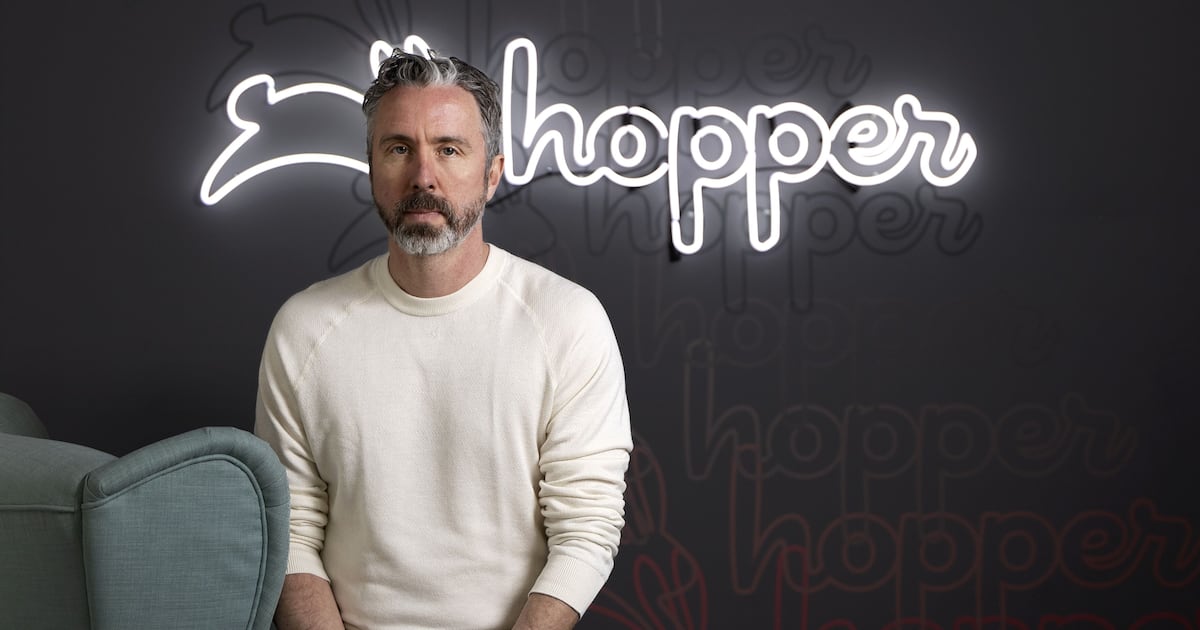(Bloomberg) — Travel data provider Hopper Inc., one of Canada’s largest closely held technology companies, is eyeing a public listing that its founder believes will value the business at as much as $10 billion.
The Montreal-based company offers price predictions for flights, hotels and car rentals by analyzing trillions of data points, and allows customers to lock in a future price for a fee. Hopper is among the most downloaded travel apps in North America, and is especially popular among millennials and Generation Z.
Hopper also has a business-to-business offering that uses its data and artificial intelligence to improve travel-booking portals for companies including Capital One Financial Corp.
Hopper has drawn comparisons to another Canadian tech success story: Shopify Inc., which listed in 2015 at a valuation of $1.3 billion and is now worth about $130 billion. Shahir Guindi, a lawyer at Osler Hoskin & Harcourt LLP who’s a longtime adviser to Hopper Chief Executive Officer Frederic Lalonde, said Hopper “already is” the next Shopify, “except it’s not public.”
Hopper has about 650 employees who work remotely around the world. The firm’s algorithms, gathered through years of travel data, have “become this enormous competitive advantage,” Lalonde, 51, said in an interview.
But the company almost didn’t make it this far. Lalonde feared a collapse of the business when the Covid-19 pandemic hit and the global travel industry seized up. “It was an unbelievable mess,” he recalled.
The firm used that period to collect more data to better manage risk and developed new products such as the “cancel for any reason” travel insurance that’s offered through websites like Air Canada’s. Hopper Technology Solutions also counts travel providers such as Capital One and Sumitomo Mitsui Card Co. as customers.
Hopper generates revenue by charging commissions on travel bookings and from services such as the price guarantee, but most of it now comes from its relationships with companies.
Hopper’s business-to-business foray caught the attention of Patrick Pichette, Google’s former chief financial officer who’s now a partner at Montreal-based venture capital firm Inovia Capital. He said he saw potential in the offering “because you have complementarity, volume and scale.” Inovia invested in 2020.
So far, Hopper has raised more than $740 million from investors such as Goldman Sachs Group Inc., Brookfield Asset Management Ltd., Citigroup Inc. and the Caisse de Depot et Placement du Quebec.
Investor Psychology
A public listing, which Lalonde hopes to do on both the Toronto Stock Exchange and Nasdaq, may value Hopper between $5 billion and $10 billion, he said.
He’s set conditions for taking his company public: It must have more than $1 billion in trailing sales — or be on track to get there within 18 months — and be profitable. Doing otherwise in a high-cost-of-capital environment is “crazy,” he said.
He wouldn’t say how close the company is to meeting those targets.
“I think people list too early. They don’t understand the psychology of public investors,” he added. “Small-cap tech is the kiss of death.”
Barriers to entry are high in the travel-booking industry, said Morningstar Inc. research analyst Dan Wasiolek. Hopper’s technology gives the firm “an edge for now” against players such as Expedia Group Inc. and Booking Holdings Inc., he said. “But to me, it seems that given the resources that those large players have, I would think that if they want those capabilities, they can probably absolutely develop those in-house.”
Lalonde said he’s also open to investment by a private equity owner with a long-term capital approach. Meanwhile, secondary transactions have provided liquidity to investors and employees.
Canada’s initial public offering market has been through a difficult few years, with few new corporate offerings. Fast-fashion retailer Groupe Dynamite Inc. was the period’s largest listing with a C$2.3 billion ($1.6 billion) valuation at the IPO last November, but the stock price has dropped by more than 15% since then.
Hacker to Founder
Lalonde, who lists “college drop-out” in the education section of his LinkedIn profile, began coding at 13 and then became a hacker. In 1997, he co-founded Newtrade Technologies, a startup that rewrote how hotel reservations are managed digitally.
Five years later, the firm was bought by Expedia, where Lalonde became a vice president. He left in 2006, not long after Expedia’s founders departed, and went snowboarding for a year. “The innovation just disappeared in months,” he said.
He founded Hopper in 2007, knowing he wanted to disrupt the flight-booking business. “It was sort of a moonshot,” recalled his close adviser Guindi.
Hopper made a breakthrough in 2013, after hiring a mathematician named Patrick Surry with no specific assignment. “One Monday morning, he walked in and said: I solved it,” Lalonde said. “He was like: ‘I can tell you which day to buy a ticket and save some money.’ We put this on the web and someone from the New York Times wrote about it.”
The Hopper app was launched in 2015.
Lalonde “wanted to build the Expedia plus, plus,” said Sophie Forest, a managing partner at Montreal’s Brightspark Ventures, which was Hopper’s first investor in 2007. The firm now owns about 7% of the company after selling a C$500,000 portion of its stake for $50 million in 2020.
Hopper also received seed money from Boston’s Accomplice Management LLC and Toronto’s OMERS Ventures Management Inc.
“Hopper had opportunities to sell many times where we would’ve made a lot of money with the founders,” Forest said. “We decided not to because the company was building something very valuable, and we think they still are.”
–With assistance from Geoffrey Morgan.
©2025 Bloomberg L.P.










